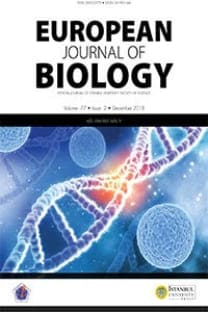Betül OKUYAN, Fikret IZZETTİN, Özlem BİNGÖL-OZAKPİNAR, Pınar TURAN, Zarife OZDEMİR, Mesut Sancar, Zeynep CİRAKLİ, Philip CLARK, Feriha ERCAN
Sıçanlarda sisplatin içeren kemoterapi rejimlerinin nefrotoksisitesi üzerine Ginkgo biloba’nın etkileri
Bu çalışmada, sıçanlarda sisplatin ve diğer kemoterapötik ajanların (etopozid ve gemsitabin) nefrotoksisitesi üzerine Ginkgo biloba’nın olası etkilerinin belirlenmesi amaçlandı. Hayvanlar, rastgele olarak ve her biri 6 adet sıçandan oluşan 10 gruba ayrıldı. Deneyin başlangıcında ve tedavi sonrasında serum BUN (kan üre azotu) ve kreatinin değerleri; tedavi sonrasında böbrek dokusu malondialdehit (MDA) seviyeleri ile glutatyon (GSH) ve miyeloperoksidaz (MPO) aktiviteleri ölçüldü. Ayrıca böbrek dokusunun histopatolojik incelemesi yapıldı. Ginkgo biloba ekstresi, sisplatin tedavisinin bir sonucu olarak yükselmiş olan serum kreatinin ve böbrek MDA seviyelerini anlamlı olarak düşürdü (p < 0.05). Aynı zamanda sisplatin tedavisi sonucu azalmış olan böbrek GSH değerlerini anlamlı olarak yükseltti (p < 0.05). Elde edilen sonuçlar, böbrek dokusunun histopatolojik değerlendirmesiyle de paralellik gösterdi. Çalışmanın sonuçlarına göre, renoprotektif ajanların kullanılması sırasında sisplatin içeren kemoterapötik rejimlerle olası etkileşimlerinin göz önünde bulundurulması gerekmektedir.
Anahtar Kelimeler:
Sisplatin içeren nefrotoksisite, Etopozid, Gemsitabin, Ginkgo biloba
The effects of Ginkgo biloba on nephrotoxicity induced by cisplatin-based chemotherapy protocols in rats
The study was aimed at investigating the possible renoprotective effects of Ginkgo biloba on nephrotoxicity
induced by cisplatin w/wo other antineoplastic agents (etoposide and gemcitabine) in rats. The
animals were randomly divided into eight groups each consisting of six rats. Serum blood urea nitrogen
(BUN) and creatinine values at baseline and after drug administration, kidney malondialdehyde (MDA),
glutathione (GSH) levels, and myeloperoxidase activity (MPO) were measured, and a histopathologic
examination of kidney tissues was carried out. Ginkgo biloba extract significantly decreased the serum
creatinine and kidney MDA levels, which had increased as a result of cisplatin administration and also
improved the depletion of kidney GSH levels in cisplatin administered rats (p
Keywords:
-,
___
- Abd-Ellah M.F. and Mariee A.D. (2007) Ginkgo biloba leaf extract (EGb 761) diminishes adria- mycin-induced hyperlipidaemic nephrotoxicity in rats: association with nitric oxide production. Biotechnology and Applied Biochemistry, 46: 35-40.
- Appenroth D., Frob S., Kertsen L., Splinter F.K. and Winnefeld K. (1997) Protective effects of vitamin E and C on cisplatin nephrotoxicity in developing rats. Archives of Toxicology , 71: 677–83.
- Bradley P.P., Priebat D.A., Christersen R.D. and Rothstein G. (1982) Measurement of cutaneous inflammation. Estimation of neutrophil content with an enzyme marker. The Journal of Inves- tigative Dermatology, 78: 206–9.
- Diamond B.J., Shiflett S.C., Feiwel N., Matheis R.J., Noskin O., Richards J.A. and Schoenberger N.E. (2000) Ginkgo biloba extract: mechanisms and clinical indications. Archives of Physical Medicine and Rehabilitation, 81: 668-78.
- Ellman, G. (1959) Tissue sulphydryl groups. Ar- chives of Biochemistry and Biophysics, 82: 70-7.
- Gulec M., Iraz M., Yılmaz H.R., Özyurt H. and Temel I. (2006). The effects of ginkgo biloba extract on tissue adenosine deaminase, xanthine oxidase, myeloperoxidase, malondialdehyde, and nitric oxide in cisplatin-induced nephro- toxicity. Toxicology and Industrial Health, 22: 125-30.
- Huang X., Whitworth C.A. and Rybak L.P. (2007). Ginkgo biloba extract (EGb 761) protects against cisplatin-induced ototoxicity in rats. Otology and Neurotology, 28: 828-33.
- Lu Q., Yin X.X., Wang J.Y., Gao Y.Y. and Pan Y.M. (2007) Effects of Ginkgo biloba on prevention of development of experimental diabetic ne- phropathy in rats. Acta Pharmacologica Sinica, 28: 818–28.
- Naik S.R., Pilgaonkar V.W. and Panda V.S. (2006). Evaluation of antioxidant activity of Ginkgo biloba phytosomes in rat brain. Phytotherapy Research, 20: 1013-16.
- Ohkawa H., Ohishi N. and Yagi K. (1979) Assay for lipid peroxides in animal tissues by thiobar- bituric acid reaction. Analytical Biochemistry , 95: 351–58.
- Oken B.S., Storzbach D.M. and Kaye J.A. (1998) The efficacy of Ginkgo biloba extract on cogni- tive function in Alzheimer disease. Archives of Neurology, 55: 1409-15.
- Ozveri E.S., Bozkurt A., Haklar G., Çetinel S., Arbak S., Yeğen C. and Yeğen B.C. (2001) Es- trogens ameliorate remote organ inflammation induced by burn injury in rats. Inflammation Research, 50: 585-91.
- Schrier R.W., Wang W., Poole B. and Mitra A. (2004) Acute renal failure: definitions, diagno- sis, pathogenesis, and therapy. The Journal of Clinical Investigation, 114: 5–14.
- Sener G., Satiroglu H., Kabasakal L., Arbak S., Oner S., Ercan F. and Keyer-Uysal M. (2000) The protective effect of melatonin on cispla- tin nephrotoxicity. Fundamental and Clinical Pharmacology, 14: 553-60.
- Sener G., Sener E., Sehirli O., Oğünç A.V., Cetinel S., Gedik N. and Sakarcan A. (2005) Ginkgo biloba extract ameliorates ischemia reperfusion- induced renal injury in rats. Pharmacological Research, 52: 216-22.
- Wang J.Y., Yin X.X., Wu Y.M., Tang D.Q., Gao Y.Y., Wan M.R., Hou X.Y. and Zhang B. (2006). Ginkgo biloba extract suppresses hypertrophy and extracellular matrix accumulation in rat mesangial cells. Acta Pharmacologica Sinica, 27: 1222-30.
- ISSN: 2602-2575
- Yayın Aralığı: Yılda 2 Sayı
- Başlangıç: 1940
- Yayıncı: İstanbul Üniversitesi Yayınevi
Sayıdaki Diğer Makaleler
Asli OZKİZİLCİK, Mustafa ATES, Burcu CERCİ
Farzaneh DEHGHANİ, Aseyeh HESHMATPOUR, Mohammad PANJEHSHAHİN, Tahereh TALAEİ-KHOZANİ
Yun SEO, Bong LEE, Khaled RASHED, Ataa SAİD
Endemik Centaurea arifolia Boiss. bitkisinin in Vitro üretimi
Elif YÜZBAŞIOĞLU, Eda DALYAN, Mehmet BONA, Gül ÖZ
Selda GEZGİNCİ-OKTAYOGLU, İsmet BURCU TURKYİLMAZ, Refiye YANARDAG, Sehnaz BOLKENT
Betül OKUYAN, Fikret IZZETTİN, Özlem BİNGÖL-OZAKPİNAR, Pınar TURAN, Zarife OZDEMİR, Mesut Sancar, Zeynep CİRAKLİ, Philip CLARK, Feriha ERCAN
